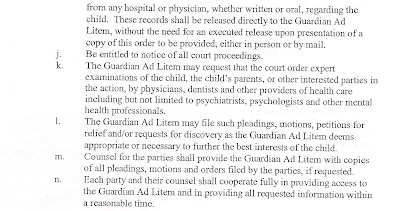Alexander cuts the Gordian Knot, by Jean-Simon Berthélemy (1743–1811) from Wikipedia.org
Let's recap Tuesday at Washington County Family Court:
Everyone is angry. On the witness stand, "Barbara" has nothing nice to say about her former partner, "Tracy," and she's angry that "the blogger" has written about their daughter's positive evaluation at the Gifted Resource Center of New England (10.M. "Zealous advocates," March 14, 2012, below).
Tracy's attorney, Keven McKenna, is angry because Barbara filed an abuse complaint in 2010; Barbara's attorney, Cynthia Gifford, succeeded in getting Judge Raymond Shawcross to sign an extraordinary three-year restraining order to "protect" Barbara and Jenny from Tracy. Barbara still claims to be in fear of imminent physical danger, but admits that Tracy never even came near her.
Judge Debra DiSegna is angry at McKenna's loud, aggressive tone. She stops him and abruptly leaves the bench.
Gifford walks McKenna out and brawls in a voice everyone can hear: "When are you gonna grow up?!"
To which McKenna responds: "When are you gonna grow up?!"
Touché!
Chastened, the attorneys return. Fifteen minutes later, Judge DiSegna is back on the bench with a big book. She calls the attorneys forward to discuss some finer points of law and finishes with a plea: "Do you see any way we can speed this up?"
McKenna says: "Cut the Gordian knot. You have authority to do it."
Aha! A classical reference that means "to cut right to the heart of the matter without wasting time on external details" the way Alexander the Great did with a single stroke of his sword, cutting an intricate knot tied by King Gordius of Phrygia, because an oracle said that whoever undid that knot would become ruler of Asia.
With that clarified, McKenna settles down and asks Barbara what she will do to help reunify their daughter, "Jenny," with her other mother.
Barbara is not keen on this. She says she will encourage Jenny to get counseling, though she has already testified that Jenny resists counseling because she does not trust adults.
When McKenna calls Tracy back to rebut, he asks her the same question in reverse, something like: What will you do to reunify with Jenny, but still maintain her relationship with Barbara?
Tracy promises to make colored calendars that coordinate all three schedules--as she had done for ten years--to help Jenny spend time with each mother.
She lists four steps for reunification:
First, over spring vacation, Tracy wants to take Jenny to see the girl's grandmother, "Gras," who cared for her often, but has been critically ill and anguished over the court case. (In one touching moment, McKenna asks if Barbara knows Gras, Tracy's mother. Tracy responds yes, she was "like a fourth daughter" to her.)
Second, Tracy will pick up Jenny from orchestra on Saturdays and deliver her to school on Mondays and will be free to talk with her teachers, to attend track meets and other events.
Third, Jenny should spend the summer with Tracy to make up for "two and a half years total blackout," but their daughter will be completely free to see Barbara whenever she wants. Jenny will soon drive and be able to travel easily between homes.
Fourth, Jenny should be allowed to audition for the state's performing arts high school and take her own time to explore her interests. She could even repeat tenth grade there, since she is a year ahead for her age. Let her take a break from the pressure and decide how she wants to finish her junior and senior years.
Will you make sacrifices? McKenna asks.
Yes! Tracy says: When I was called up after 9/11, I drove a thousand miles every week to see my daughter. I never missed a visit!
Tracy has a large notebook with 170 exhibits to show that she thought she and Barbara were engaged in a good-faith effort at mediation with the late Dr. Judith Lubiner.
She mentions disturbing items in the court file, including a strangely substituted order without any court stamp. (Perhaps I will return to these later.)
Near the end of the day, Tracy says she felt "deceived." Judge DiSegna stops McKenna mid-question and asks the stenographer: Did you get that? I want the record to show that she felt "deceived."
Suddenly the hearing is over, and final arguments set for April 3rd. Is the Gordian knot getting pulled tighter? Or is it about to be cut?























